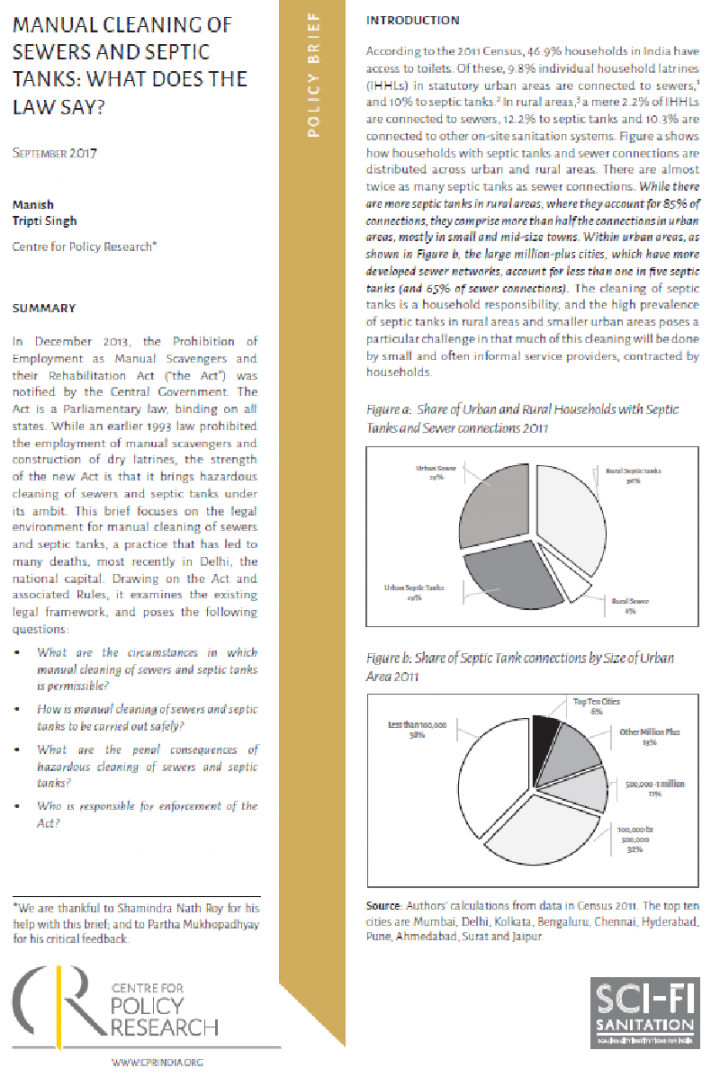Scaling City Institutions for India: Sanitation - Updates from SCI-FI project CPR (2018)
This library entry contains several documents produced by the SCI-FI project which wa led by Shubhagato Dasgupta and funded by the Bill & Melinda Gates Foundation.
Name of lead organization: Centre for Policy Research
Primary contact at lead organization: Shubhagato Dasgupta, Senior Fellow
Grantee location: New Delhi, India
Developing country where the research is being carried out: India
Start and end date: Phase 1: 14.11.2012 to 30.11.2015, Phase 2: 09.11.2015 to 31.12.2018
The following documents are available for download below:
- Presentation on evolution of sanitation policies and programs in India, FSM3 Conference in Hanoi (January 2015)
- Manual Cleaning of Sewers and Septic tanks (September 2017)
Content: In December 2013, the Prohibition of Employment as Manual Scavengers and their Rehabilitation Act (“the Act”) was notified by the Central Government. The Act is a Parliamentary law, binding on all states. While an earlier 1993 law prohibited the employment of manual scavengers and construction of dry latrines, the strength of the new Act is that it brings hazardous cleaning of sewers and septic tanks under its ambit. This brief focuses on the legal environment for manual cleaning of sewers and septic tanks, a practice that has led to many deaths, most recently in Delhi, the national capital. Drawing on the Act and associated Rules, it examines the existing legal framework, and poses the following questions:
What are the circumstances in which manual cleaning of sewers and septic tanks is permissible?
How is manual cleaning of sewers and septic tanks to be carried out safely?
What are the penal consequences of hazardous cleaning of sewers and septic tanks?
Who is responsible for enforcement of the Act?
++++++++
Further documents (download links are further down below):
- Why Sanitation Policy Needs to Look Past Toilets (September 2017)
- Capacity Building Needs Assessment of Cities (Angul and Dhenkanal) and State Government on Sanitation (March 2017)
- Redefining Universal Sanitation a Gender Perspective (May 2018)
Bibliographic information
CPR (2018). Scaling City Institutions for India: Sanitation - Updates from SCI-FI project Centre for Policy Research (CPR), New Delhi, India
Filter / Tags
Urban (entire city)Politicians and local decision makersPractitionersFactsheets and policy briefsEnglish
External links
Discussion on SuSanA Discussion Forum
Downloads
Presentation on evolution of sanitation policies and programs in India, FSM3 Conference in Hanoi (January 2015)
Type: application/pdf
Size: 2.97 MB
Manual Cleaning of Sewers and Septic tanks
Type: application/pdf
Size: 0.24 MB
Why Sanitation Policy Needs to Look Past Toilets
Type: application/pdf
Size: 0.53 MB
Capacity Building Needs Assessment of Cities (Angul and Dhenkanal) and State Government on Sanitation
Type: application/pdf
Size: 1.13 MB
Redefining Universal Sanitation a Gender Perspective
Type: application/pdf
Size: 3.23 MB

